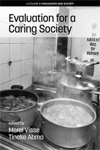
Evaluation for a Caring Society
Edited by:
Merel Visse, the University of Humanistic Studies
Tineke A. Abma, VU University Medical Centre
A volume in the series: Evaluation and Society. Editor(s): Stewart I. Donaldson, Claremont Graduate University. Katrina L. Bledsoe, Education Development Center.
Published 2018
This book highlights views on responsive, participatory and democratic approaches to evaluation from an ethos of care. It critically scrutinizes and discusses the invisibility of care in our contemporary Western societies and evaluation practices that aim to measure practices by external standards. Alternatively, the book proposes several foci for evaluators who work from a care perspective or wish to encourage a caring society. This is a society that sees evaluation and care as a continuously unfolding relational practice of moral-political learning contributing to life-sustaining webs.
‘At one level is the evaluator’s immediately responsive and interpersonal encounter with the personal troubles of social actors, most visible, as Mills originally pointed out, in an individual’s biography and in those social settings directly open to the individual’s lived experience. (...) At another level, the sociological and political level, the evaluator operates at what Mills called the arena of public issues where immediate personal troubles are seen not only as problems encountered by individuals but as the result of structural and political arrangements in society (...) evaluation for a caring society is thought to operate at both levels’ (Thomas A. Schwandt, Professor Emeritus, University of Illinois at Urbana-Champaign).
‘The intricate relationship between evaluation and care is hardly addressed by evaluators or caregivers. This book fills a gap, as it focuses on the relationship between evaluation and care and provides a multitude of examples of evaluation as a caring practice (...) the book can serve as an antidote to the present-day haste in social practices, and contribute, in form and content, to developing an evaluation practice which may foster a caring society’ (Guy Widdershoven, Professor of Philosophy and Ethics of Medicine and head of the Department of Medical Humanities at VU University Medical Center, VU University Amsterdam).
CONTENTS
Foreword, Thomas Schwandt. Foreword, Guy Widdershoven. Acknowledgements. Introduction, Merel Visse and Tineke Abma. On the Photo-Story of the Carefreestate, Tineke Abma, Merel Visse, and Janine Schrijver. PART I: THEORETICAL REFLECTIONS ON A CARING SOCIETY. Care, Competency, and Knowledge, Maurice Hamington. The Art of Understanding, Karin Dahlberg. PART II: DEMOCRATIC EVALUATION FOR A CARING SOCIETY. Democratic Evaluation and Care Ethics, Helen Simons and Jennifer C. Greene. Democratic Caring Evaluation for Refugee Children in Sweden, Anders Hanberger. PART III: ETHICS AND EVALUATION FOR A CARING SOCIETY. Uncontrolled Evaluation: The Case of Telecare Innovations, Jeannette Pols. Evaluation for Moving Ethics in Health Care Services Towards Democratic Care: A Three Pillars Model: Education, Companionship, and Open Space, Helen Kohlen. PART IV: RESPONSIVE EVALUATION FOR A CARING SOCIETY. Responding to Otherness: The Need for Experimental-Relational Spaces, Gustaaf Bos and Tineke Abma. Dialogue, Difference, and Care in Responsive Enactments of a World-Becoming, Melissa Freeman. Responsive Evaluation as a Way to Create Space for Sexual Diversity: A Case Example on Gay-Friendly Elderly Care, Hannah Leyerzapf, Merel Visse, Arwin de Beer, and Tineke Abma. Evaluation for a Caring Society: Toward New Imaginaries, Merel Visse and Tineke Abma. About the Contributors.
-
Paperback9781641131636
Web price: $45.04 (Reg. 52.99)
-
Hardcover9781641131643
Web price: $80.74 (Reg. 94.99)
- eBook9781641131650

- MED043000 - MEDICAL: Hospital Administration & Care
- MED050000 - MEDICAL: Ethics
- MED011000 - MEDICAL: Caregiving
-
 Democratic Evaluation and Democracy
Exploring the Reality
Democratic Evaluation and Democracy
Exploring the Reality
-
 Disrupting Program Evaluation and Mixed Methods Research for a More Just Society
The Contributions of Jennifer C. Greene
Disrupting Program Evaluation and Mixed Methods Research for a More Just Society
The Contributions of Jennifer C. Greene
-
 Growing the Knowledge Base in Evaluation
The Contributions of J. Bradley Cousins
Growing the Knowledge Base in Evaluation
The Contributions of J. Bradley Cousins
-
 Outcome Harvesting
Principles, Steps, and Evaluation Applications
Outcome Harvesting
Principles, Steps, and Evaluation Applications
-
 Practical Wisdom for an Ethical Evaluation Practice
Practical Wisdom for an Ethical Evaluation Practice
-
 System Evaluation Theory
A Blueprint for Practitioners Evaluating Complex Interventions Operating and Functioning as Systems
System Evaluation Theory
A Blueprint for Practitioners Evaluating Complex Interventions Operating and Functioning as Systems
-
 Visionary Evaluation for a Sustainable, Equitable Future
Visionary Evaluation for a Sustainable, Equitable Future

